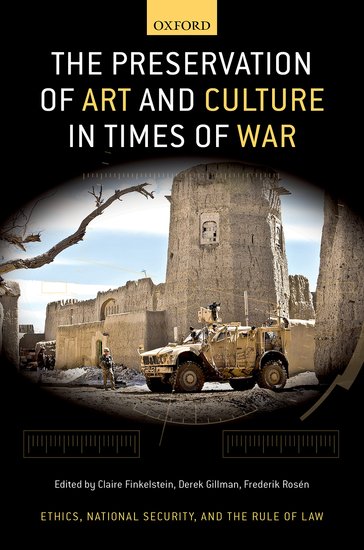More than two decades spent prosecuting the war on terror in Afghanistan and Iraq serve as a painful reminder of the vulnerability of art and cultural heritage in times of war. The wanton destruction of the Bamiyan Buddhas, for example, sent shockwaves throughout the international community. ISIS targeted numerous locations of cultural and religious significance, decimated museums and destroyed or sold thousands of valuable articles of cultural heritage, engaged in looting of archeological sites and other areas of cultural and historic significance, and destroyed ancient texts and manuscripts in a fervor of religious and cultural despotism. In the wake of this tragic attack on cultural heritage in the Middle East, the international community rallied to try to preserve as well as restore the lost art and culture of the affected regions. Just over twenty years since the war on terror began, the sovereign nation of Ukraine confronts similar challenges: As the Ukrainians fight for the autonomy of their country and the survival of their nation’s culture, their adversary is using cultural destruction as a tool of war in an effort to eliminate Ukrainian culture as a separate entity. What can the world learn about these dramatic examples of attacks on culture through war? Did the efforts to preserve art and culture in Iraq and Afghanistan translate into greater awareness of the need to protect cultural heritage in Ukraine, even in the face of an existential battle for the survival of the nation? What lessons can be drawn about cultural heritage preservation in the midst of armed conflict, and how must international law and policy evolve to address such challenges?
PANELISTS
Prof. Derek Gillman, Drexel University
Derek Gillman is Distinguished Teaching Professor, Art History and Museum Leadership, and Executive Director of University Collections and Exhibitions, Drexel University. He was President of the Barnes Foundation from 2006-13 and, prior to that, of the Pennsylvania Academy of the Fine Arts. He is author of The Idea of Cultural Heritage (Cambridge University Press), a board member of the International Cultural Property Society, an emeritus member of the Association of Art Museum Directors, and a consulting scholar in the Asian Section of the University of Pennsylvania Museum.
Prof. Jeff McMahan, University of Oxford
Jeff McMahan is Sekyra and White’s Professor of Moral Philosophy at the University of Oxford and a Fellow of Corpus Christi College. He works primarily in moral and political philosophy and has written on such issues as abortion, infanticide, euthanasia, the ethics of our treatment of animals, and the ethics of self-defense and war. He is the author of The Ethics of Killing: Problems at the Margins of Life (Oxford University Press, 2002) and Killing in War (OUP, 2009). At present he is writing a book, The Ethics of Creating, Preserving, and Ending Lives, which will also be published by OUP.
Prof. Lynn Meskell, University of Pennsylvania
Lynn Meskell is Penn Integrates Knowledge Professor in the School of Arts and Sciences and Professor of Historic Preservation in the Weitzman School of Design. At the Penn Museum, she is curator in the Middle East and Asia sections. She is also AD White Professor-at-Large at Cornell University. Lynn holds Honorary Professorships at Oxford University, Liverpool University, Shiv Nadar in India and the University of the Witwatersrand in South Africa. Previously, she was the Shirley and Leonard Ely Professor of Humanities and Sciences at Stanford University. Lynn is the founding editor of the Journal of Social Archaeology. Her most recent book A Future in Ruins: UNESCO, World Heritage, and the Dream of Peace (2018, OUP New York), won the Society for American Archaeology book award and reveals UNESCO’s early forays into a one-world archaeology and its later commitments to global heritage. She is currently examining the entwined histories of colonialism, internationalism, espionage and archaeology in the Middle East coupled with a new largescale survey project in Syria and Iraq to assess public opinion on heritage destruction and reconstruction. Other recent fieldwork explores monumental regimes of research and preservation around World Heritage sites in India and how diverse actors and agencies address the needs of living communities.
Moderator
Prof. Claire Finkelstein, University of Pennsylvania
Claire Finkelstein is the Algernon Biddle Professor of Law and Professor of Philosophy at the University of Pennsylvania and a distinguished research fellow at the Annenberg Public Policy Center (APPC) as well as a senior fellow at the Foreign Policy Research Institute (FPRI). She is the Founder and Faculty Director of Penn’s Center for Ethics and the Rule of Law. An expert in the law of armed conflict, military ethics, and national security law, she is a co-editor (with Jens David Ohlin) of The Oxford Series in Ethics, National Security, and the Rule of Law and a well-published author in the areas of national security and democratic governance. Professor Finkelstein is a frequent radio, broadcast, and print commentator.






